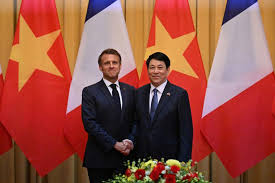Macron arrives in Vietnam, signs key deals on aircraft, defence and satellites amid US tariff threats

French President Emmanuel Macron recently visited Vietnam, marking a significant step in France’s relationship with Southeast Asia. This was the first visit by a French head of state to Vietnam in nearly ten years. Macron’s trip highlights France’s desire to strengthen strategic ties and boost economic cooperation in the region. The visit comes amid growing global trade tensions. The United States has threatened high tariffs on European goods. In this context, France and Vietnam signed important agreements in aviation, defense, and satellite technology.
Strengthening Aviation Ties: Airbus Expansion in Vietnam
One of the key outcomes of Macron’s visit was a major deal between Vietnam’s low-cost airline, VietJet Air, and Airbus. VietJet agreed to buy 20 more Airbus A330neo wide-body aircraft. This doubles the airline’s previous order and confirms Airbus’s strong presence in Vietnam. Airbus now supplies over 85% of Vietnam’s commercial aircraft.
The A330neo model is fuel-efficient and has a long range. This helps VietJet expand its international flights. The deal reflects Vietnam’s growing demand for air travel due to its booming economy. For France, the contract supports aerospace jobs and strengthens its industrial footprint in a key market. It also shows Vietnam’s trust in European technology.
Defense Cooperation: A Growing Strategic Partnership
Macron’s visit also deepened defense ties between France and Vietnam. The two countries agreed to expand cooperation in defense technology, cybersecurity, and counter-terrorism. Vietnam is keen to diversify its security partnerships beyond its traditional allies.
The agreement includes intelligence sharing, joint military training, and collaboration on new defense technologies. This partnership fits into France’s larger Indo-Pacific strategy. France wants to support regional stability amid rising tensions in the South China Sea and elsewhere.
Additionally, France and Vietnam agreed to work together on satellite technology. They will develop new Earth observation satellites to replace Vietnam’s aging systems. These satellites will help with environmental monitoring, disaster management, and resource mapping. This technology is crucial for Vietnam’s climate resilience and national security.
Satellite and Space Technology: Modernizing Vietnam’s Infrastructure
Vietnam aims to modernize its space infrastructure through this partnership. The new satellites will provide critical data for agriculture, urban planning, and disaster preparedness. They will also support maritime surveillance, an area of increasing importance given Vietnam’s territorial disputes.
By enhancing its satellite capabilities, Vietnam gains better control over its environment and maritime domain. For France, this cooperation showcases its leadership in aerospace technology and strengthens ties with a growing market.
Nuclear Energy and Infrastructure: Exploring Future Opportunities
Macron and Vietnamese leaders also discussed nuclear energy cooperation. Vietnam is considering reviving its nuclear power program to meet rising energy needs. France, known for its advanced nuclear technology, is a natural partner.
While no formal deals were made, both countries expressed interest in future collaboration. This could include helping with nuclear plant construction and safety standards. They also talked about high-speed rail and renewable energy projects. These discussions align with Vietnam’s plans to modernize infrastructure and promote clean energy.
Healthcare and Pharmaceuticals: Expanding Collaboration
Healthcare was another focus during Macron’s visit. France’s pharmaceutical company Sanofi plans to increase cooperation with Vietnam on vaccine production and distribution. This partnership aims to improve public health and vaccine access in Vietnam.
This cooperation is part of wider efforts to strengthen healthcare systems in Southeast Asia. It is especially important as countries prepare for future pandemics and health emergencies.
Navigating US Tariff Threats: A Diplomatic Balancing Act
Macron’s visit took place amid rising trade tensions with the United States. The US government has threatened tariffs of up to 50% on European goods. Vietnam, a major trading partner with both the US and EU, faces pressure to balance its relations.
The US wants Vietnam to buy more American products to avoid tariffs. Meanwhile, the EU, including France, advises Vietnam not to jeopardize its trade ties with Europe. Macron’s trip thus has a clear diplomatic aim. It signals that France is a reliable and supportive partner willing to work with Vietnam’s economic goals.
By signing new agreements, France hopes to increase its influence in Southeast Asia. It offers Vietnam an alternative to more aggressive trade pressures from the US and China.
Strategic Importance for France in the Indo-Pacific
Macron’s visit to Vietnam was part of a larger tour in Southeast Asia, including Indonesia and Singapore. The Indo-Pacific region is central to France’s foreign policy goals. France wants to play a strong role supporting open trade, sovereignty, and stability.
Through these partnerships, France projects soft power and counters the influence of China and the US. It focuses on advanced industries like aerospace, defense, and energy. This approach aims for sustainable cooperation with regional countries.
Conclusion: A New Chapter in France-Vietnam Relations
Emmanuel Macron’s visit to Vietnam opens a new chapter of cooperation. The agreements in aviation, defense, satellite technology, and healthcare show shared ambitions for growth and security.
Vietnam faces challenges amid global trade tensions. France’s engagement offers a stable, high-tech partnership aligned with Vietnam’s development plans. This visit strengthens France’s role in Southeast Asia and highlights the value of diversified alliances.
With these new deals and growing diplomatic ties, the France-Vietnam relationship is set to thrive. Both countries benefit, contributing to peace and prosperity in the region.






